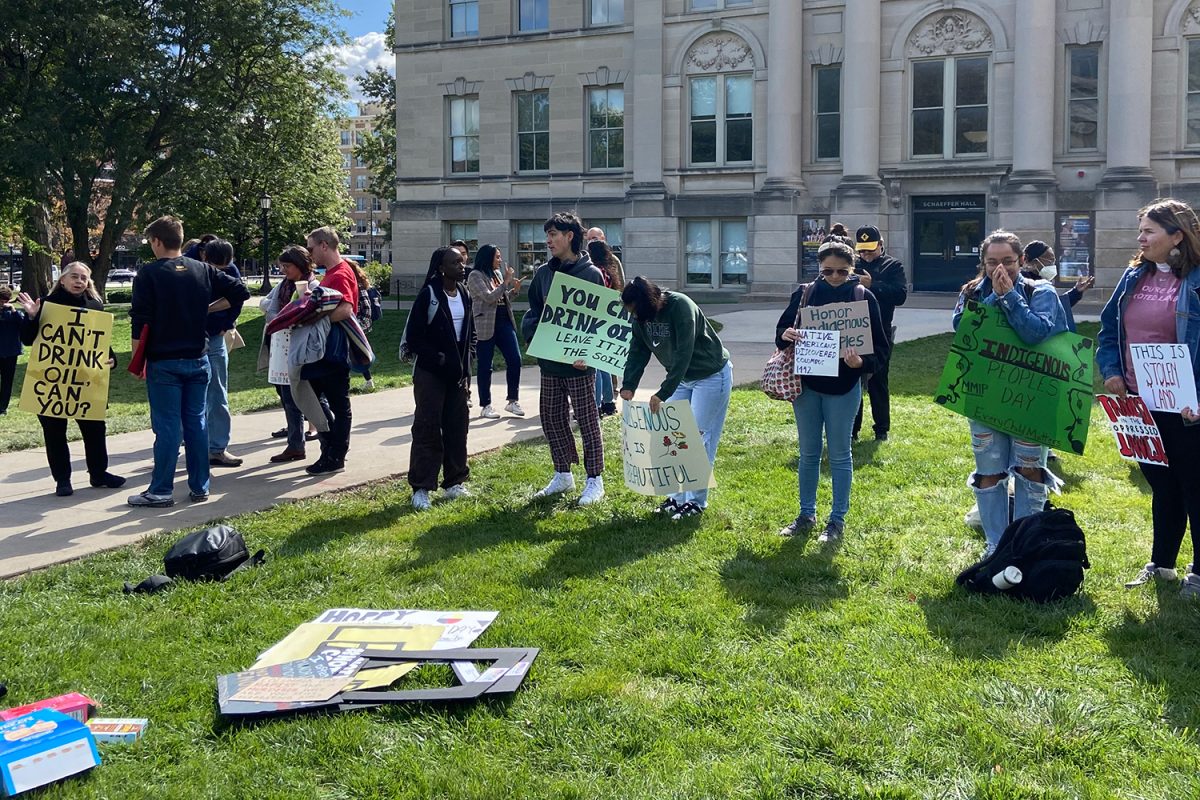Native American Student Association and Latino Native American Cultural Center members and students gathered at the University of Iowa Pentacrest Monday for a decolonization rally on Indigenous Peoples’ Day.
Indigenous Peoples’ Day is celebrated annually on the second Monday in October. The day is celebrated and reserved as a day of remembrance, preservation, and education. It is meant to bring awareness to the history of Indigenous peoples, the painful events and treatment they have faced, and bring together different communities.
Many individuals of all cultures came together to advocate for their beliefs through speeches and music. Some participants held signs that read statements, such as “This is stolen land” and “Abolish Columbus Day,” among others.
Abigail Buffalo, president of the Native American Student Association and a member of the Meskwaki Sac and Fox Tribe of Mississippi in Iowa, spoke about her connections to Indigenous culture and the importance of celebrating Indigenous Peoples’ Day in an interview with The Daily Iowan.
“Today is really about two things: celebration and education,” Buffalo said. “It’s just to show that we’re here, we’re living, we’re thriving, and just celebrate us today.”
Buffalo said education focuses on changing the perception of the day away from Columbus Day because the historical figure is not the hero he is often portrayed to be.

She said the purpose of this event was to create a space for Indigenous individuals to come and feel cared for, loved, heard, and supported. The presence of attendees rallying together and spreading the word that Indigenous people are here and still exist as a foundational purpose of the event, Buffalo said.
Buffalo said while the story of discovering America is important, schools should also focus on the truth of what happened after Columbus landed, including the enslavement and mass genocide of Indigenous people through murder and disease.
“Growing up, I honestly didn’t learn a lot [about Indigenous history],” Buffalo said. “I learned through family and my own research.”
Chérie Haury-Artz, an archaeological technician from the Office of the State Archaeologist at the UI, talked about the background and educational aspects of the day. Haury-Artz said she educates people every day at the office.
“People need to recognize the importance of those cultures and honor them. They are not gone,” she said. “When they talk about decolonization here, to me that means to open up our way of thinking.”
She said the education system hasn’t done a good job covering topics relating to Indigenous peoples.
“For part of my job, I have looked at curriculums from elementary schools and often they focus on the Iroquois, Navajo, Lakota, and Sioux tribes, and they neglect all other tribes throughout North America,” she said. “Very little is said about the time depth as well.”
Haury-Artz works with the Native American Council and attended the event in support of her friends and colleagues who are Indigenous and in the Native American Student Association.
She said Monday was important to support these groups of people but also recognize that Native American and Indigenous cultures still exist.
“We need to understand what happened to them,” Haury-Artz said. “It took only 20 years before Iowa went from a state occupied almost exclusively by Native Americans to a state almost occupied exclusively by Euro-Americans. People need to recognize what happened.”
RELATED: Native American students and community members make an impact in Iowa City
When asked what the education system or media could do to better represent and teach about Indigenous people, Buffalo said the biggest part of educating people includes the portrayal that these cultures still exist and are modern.
“I feel like the biggest thing for schools and companies, specifically movies, portraying Native Americans as these people in the past that aren’t modernized, are the hunter and gatherer stereotype are what many people see and understand Native Americans are,” Buffalo said. “But we are here living today. We are just as modernized as any other person is.”



